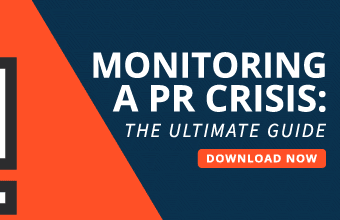As negative headlines begin to dominate news outlets, social media buzzes with speculation, and phones ring incessantly with concerned stakeholders from an organization engulfed in crisis. The situation starts threatening the company’s reputation, financial stability, and employee morale.
Amidst such turbulence, one way exists to navigate these choppy waters and steer towards calmer seas. The solution is a well-crafted crisis communication plan. This isn’t a dusty document that’s meant to be gathering cobwebs on a shelf.
A crisis PR plan serves as a lifeline during critical times. It acts as a roadmap. It’s made to help guide communication efforts, mitigate potential damage, and foster a sense of control amidst the chaos. This way, the company can ensure its survival and eventual recovery.
The importance of a crisis communication plan
Crisis situations can strike suddenly and without warning. They tend to end up disrupting normal operations in various forms. Common examples include a product safety scare, a data breach, a natural disaster, or even a public relations misstep.
Regardless of the trigger, the consequences can be far-reaching and devastating for any business. The capacity to respond swiftly and effectively can mean the difference between a manageable setback and an existential threat.
Protecting reputation
A crisis can quickly become a PR nightmare. It could end up eroding the trust that the company painstakingly built with stakeholders over years or even decades. Clear, consistent, and transparent messaging during a crisis, helps control the narrative and minimize reputational damage.
This can only be achieved with the help of a communication plan. This proactive approach presents the organization as responsible, responsive, and trustworthy. If handled the right way, effective crisis communication can preserve and even enhance the organization’s reputation.
Mitigating losses
A crisis can have a significant financial impact, aside from the reputational damage. Investor confidence may waver, sales may plummet, and legal liabilities can mount. A crisis communication plan aids in managing the situation effectively. By providing timely and accurate information, the company can prevent panic and maintain market stability.
The plan also helps address stakeholder concerns efficiently, potentially minimizing lawsuits and other financial repercussions. Moreover, a well-executed plan can facilitate quicker recovery and return to normal business operations, thereby reducing long-term financial damage.
Ensuring business continuity
A crisis can throw an entire operation into disarray. Communication channels may become overloaded, key decision-makers may be unavailable, and essential tasks may be neglected. A crisis communication plan aids in maintaining operational continuity by outlining clear communication protocols, assigning roles and responsibilities, and prioritizing critical tasks.
This ensures that essential functions continue even during a crisis. The plan can also include contingency measures for various scenarios, further enhancing the organization’s resilience.
Navigating legal issues
Crises can have complex legal ramifications. A well-crafted communication plan helps navigate these legal challenges by ensuring compliance with relevant regulations and legal requirements.
For example, during a product recall, a clear and concise communication plan that adheres to all legal regulations can help minimize potential lawsuits and fines. Integrating legal considerations into every aspect of the crisis response provides an extra layer of protection against legal vulnerabilities.








